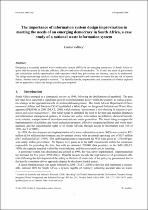 ResearchSpace
ResearchSpace
Importance of information system design improvisation in meeting the needs of an emerging democracy in South Africa, a case study of a national waste information system
JavaScript is disabled for your browser. Some features of this site may not work without it.
- ResearchSpace
- →
- Research Publications/Outputs
- →
- Conference Publications
- →
- View Item
| dc.contributor.author |
Godfrey, Linda K

|
|
| dc.date.accessioned | 2009-04-03T07:27:57Z | |
| dc.date.available | 2009-04-03T07:27:57Z | |
| dc.date.issued | 2006-09 | |
| dc.identifier.citation | Godfrey, L.K. 2006. The importance of information system design improvisation in meeting the needs of an emerging democracy in South Africa, a case study of a national waste information system. EnviroInfo 2006, Graz, Austria 6-8 September, pp 8 | en |
| dc.identifier.uri | http://hdl.handle.net/10204/3278 | |
| dc.description | EnviroInfo 2006, Graz, Austria 6-8 September 2006 | en |
| dc.description.abstract | Designing a successful national waste information system (WIS) for an emerging democracy in South Africa requires that the system be relevant, efficient, effective and above all sustainable. To do this, the needs of government and stakeholders and the opportunities and constraints which face government and industry, need to be understood. The design methodology needs to consider these needs, opportunities and constraints to ensure that the risk of system failure, whether total or partial is reduced. The identified needs, opportunities and constraints are further explored and an approach to reduce the design-actuality gap proposed | en |
| dc.language.iso | en | en |
| dc.subject | National waste information system | en |
| dc.subject | NWIS | en |
| dc.subject | Waste management | en |
| dc.subject | Technology constraints | en |
| dc.subject | Capacity constraints | en |
| dc.subject | Financial constraints | en |
| dc.subject | EnviroInfo 2006 | en |
| dc.title | Importance of information system design improvisation in meeting the needs of an emerging democracy in South Africa, a case study of a national waste information system | en |
| dc.type | Conference Presentation | en |
| dc.identifier.apacitation | Godfrey, L. K. (2006). Importance of information system design improvisation in meeting the needs of an emerging democracy in South Africa, a case study of a national waste information system. http://hdl.handle.net/10204/3278 | en_ZA |
| dc.identifier.chicagocitation | Godfrey, Linda K. "Importance of information system design improvisation in meeting the needs of an emerging democracy in South Africa, a case study of a national waste information system." (2006): http://hdl.handle.net/10204/3278 | en_ZA |
| dc.identifier.vancouvercitation | Godfrey LK, Importance of information system design improvisation in meeting the needs of an emerging democracy in South Africa, a case study of a national waste information system; 2006. http://hdl.handle.net/10204/3278 . | en_ZA |
| dc.identifier.ris | TY - Conference Presentation AU - Godfrey, Linda K AB - Designing a successful national waste information system (WIS) for an emerging democracy in South Africa requires that the system be relevant, efficient, effective and above all sustainable. To do this, the needs of government and stakeholders and the opportunities and constraints which face government and industry, need to be understood. The design methodology needs to consider these needs, opportunities and constraints to ensure that the risk of system failure, whether total or partial is reduced. The identified needs, opportunities and constraints are further explored and an approach to reduce the design-actuality gap proposed DA - 2006-09 DB - ResearchSpace DP - CSIR KW - National waste information system KW - NWIS KW - Waste management KW - Technology constraints KW - Capacity constraints KW - Financial constraints KW - EnviroInfo 2006 LK - https://researchspace.csir.co.za PY - 2006 T1 - Importance of information system design improvisation in meeting the needs of an emerging democracy in South Africa, a case study of a national waste information system TI - Importance of information system design improvisation in meeting the needs of an emerging democracy in South Africa, a case study of a national waste information system UR - http://hdl.handle.net/10204/3278 ER - | en_ZA |





